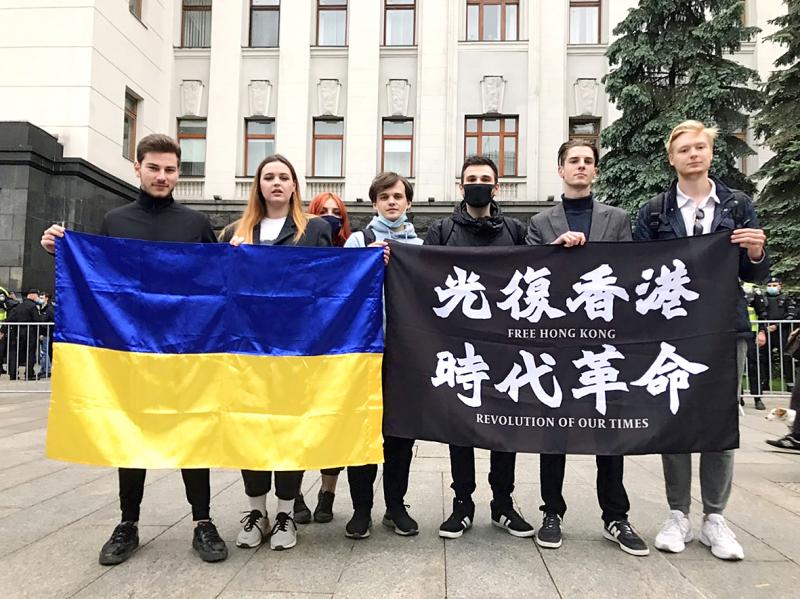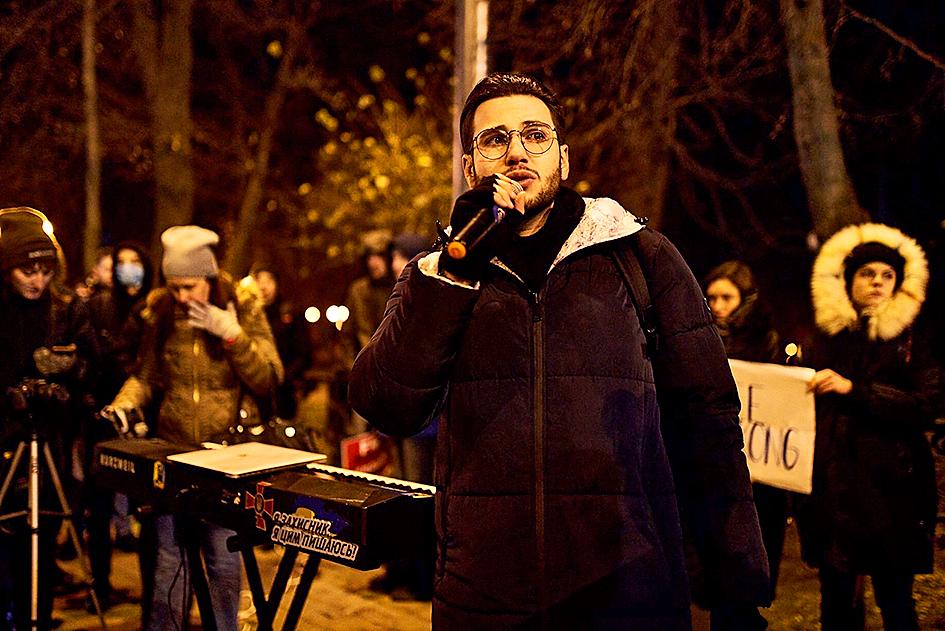When he woke on Feb. 24, Arthur Kharytonov, the President of the Liberal Democratic League of Ukraine (LDLU), checked his phone.
Overnight he had received 20 messages from Hong Kong Democracy leaders, a group he has supported since 2014, in his secondary role in politics as the main coordinator of Ukraine’s Free Hong Kong Center.
Only after reading some of those messages did he learn, as he said himself “that the war [with Russia] had started”

Photo courtesy of Arthur Kharytonov
Confusion followed.
“I checked the news, and for the next week we were full of frustration. There was no clear understanding of what was going on [but] we started to work with the international community and our partners… to support the Ukrainian army.”
Fast-forward to “Day 17” after Russian troops and tanks first crossed the border, and an interview with the Taipei Times from a bomb shelter somewhere in the capital Kyiv.

Photo courtesy of Arthur Kharytonov
Kharytonov, 26, admitted to initially being “skeptical” that Russia would invade at all, despite a massive military build-up in border regions preceding the invasion. He is no longer confused, and in the past two weeks says he has “heard huge explosions and gunfire from my windows.”
This has steeled him too.
“Like the majority of Ukrainians I have become more [strong] inside, because right now, I know which values I will fight for after the victory of Ukraine. And I know which expletives I will use for our allies who still believe everyone is secure. Right now, no-one in Europe is secure. We don’t know what the consequences for Europe will be, [or after that] for every person on the planet” he says.
ONLINE WAR
Kharytonov has been unable to join a front line military unit for medical reasons, but is helping to lead the online war against Moscow.
“We all have the tools to support, to help” he says. “This war is taking place in 2022. It’s a cyber-war and we have a lot of work to do as Ukrainians, so if we are not strong enough to fight [in the streets] we can use cyber know-how to protect our country.”
As a long term political opponent of the now hugely popular President Volodymyr Zelenskyy, Kharytonov said: “In the first hours of the war, all political parties and groups made an informal agreement that we are standing with the government, with President Zelenskyy, regardless of political differences. My organization had huge clashes with Zelenskyy’s party, but once the war began we had no choice but to be united. Right now, he has our full support. We have no time for politics. We only have time to defend our country and we will do everything to protect him as the elected president of Ukraine.”
Yet, despite reports that all Ukrainian men have been ordered to stay and protect Ukraine, Kharytonov did touch upon one issue largely unknown outside the country.
“My personal decision was to stay” he says, but “a group of people in Ukraine are scared, men included, and they have escaped to western Ukraine, including people from Kyiv. It’s a war. I will not judge them. I know that some men have bribed the guards on the border, and have been arrested, but this number is small. The majority of men are fighting on all the front lines, not only with guns.”
GLOBAL RESPONSE
Moving to the global response to the invasion, he offered praise to his friends in Hong Kong saying that “from the very first hours of the invasion, Hong Kongers actively supported us, they sent a lot of money to the Ukrainian army. Connections between Ukraine and Hong Kong are very strong.”
He was much less complimentary about NATO’s reaction to the invasion, however.
“From the first day we have been talking about a no-fly zone for Ukraine because we know NATO has imposed these before, but we now know that NATO is now ready to sacrifice Ukraine [and will] only impose sanctions on Russia. Some people are disappointed, and there is talk that we don’t need to join NATO, if NATO is so weak.”
Praise did flow regarding military contributions from individual nations in the West though, with Kharytonov saying “without [Western] military equipment we could never be so successful.”
But he is still urging Ukraine’s allies to put troops on the ground. “We already have international volunteers from almost 50 countries, but of course a professional army would be more effective.”
Failing this, support for limiting Russian air operations remained at the forefront of Kharytonov’s mind, even if, as he says, “Western leaders think it will cause World War III and lead to nuclear war.”
TAIWAN CAN DO MORE
Taiwan meanwhile, where several hundred anti-war demonstrators marched through Taipei on Sunday was also discussed.
“We witnessed Taiwan’s success in its fight against the coronavirus. The LDLU is very pro-Taiwanese. Unfortunately the government of Ukraine has not been so [supportive, which] is shameful. After the war, after the victory, that will change.”
In response to Taiwan’s increasing financial and humanitarian donations, in addition to public declarations of support from President Tsai Ing-wen (蔡英文) and Minister of Foreign Affairs Joseph Wu (吳釗燮), Kharytonov said he was “thankful” but called the lack of “strong response” from his own government in return the result of Kyiv’s desire to one day see Russia removed from the UN Security Council — a move he notes requires Chinese support in the voting process.
Thankful Kharytonov may be, and while he admitted that members of the Ukrainian government are supportive of Taiwan, and that wider Ukrainian society was generally supportive of Taiwan’s international role, in closing he made a request for Taiwan to really stand out to Ukrainians by sending “some military support” — body armor in particular — a possibility the ruling Democratic Progressive Party has yet to openly address.

Mongolian influencer Anudari Daarya looks effortlessly glamorous and carefree in her social media posts — but the classically trained pianist’s road to acceptance as a transgender artist has been anything but easy. She is one of a growing number of Mongolian LGBTQ youth challenging stereotypes and fighting for acceptance through media representation in the socially conservative country. LGBTQ Mongolians often hide their identities from their employers and colleagues for fear of discrimination, with a survey by the non-profit LGBT Centre Mongolia showing that only 20 percent of people felt comfortable coming out at work. Daarya, 25, said she has faced discrimination since she

April 21 to April 27 Hsieh Er’s (謝娥) political fortunes were rising fast after she got out of jail and joined the Chinese Nationalist Party (KMT) in December 1945. Not only did she hold key positions in various committees, she was elected the only woman on the Taipei City Council and headed to Nanjing in 1946 as the sole Taiwanese female representative to the National Constituent Assembly. With the support of first lady Soong May-ling (宋美齡), she started the Taipei Women’s Association and Taiwan Provincial Women’s Association, where she

More than 75 years after the publication of Nineteen Eighty-Four, the Orwellian phrase “Big Brother is watching you” has become so familiar to most of the Taiwanese public that even those who haven’t read the novel recognize it. That phrase has now been given a new look by amateur translator Tsiu Ing-sing (周盈成), who recently completed the first full Taiwanese translation of George Orwell’s dystopian classic. Tsiu — who completed the nearly 160,000-word project in his spare time over four years — said his goal was to “prove it possible” that foreign literature could be rendered in Taiwanese. The translation is part of

It is one of the more remarkable facts of Taiwan history that it was never occupied or claimed by any of the numerous kingdoms of southern China — Han or otherwise — that lay just across the water from it. None of their brilliant ministers ever discovered that Taiwan was a “core interest” of the state whose annexation was “inevitable.” As Paul Kua notes in an excellent monograph laying out how the Portuguese gave Taiwan the name “Formosa,” the first Europeans to express an interest in occupying Taiwan were the Spanish. Tonio Andrade in his seminal work, How Taiwan Became Chinese,